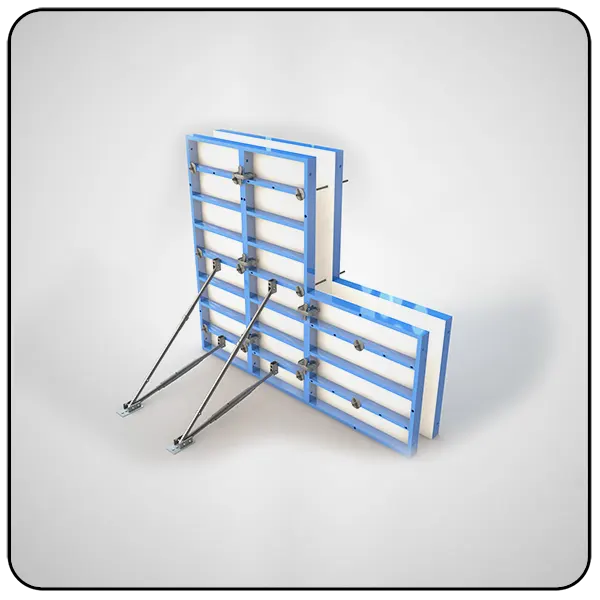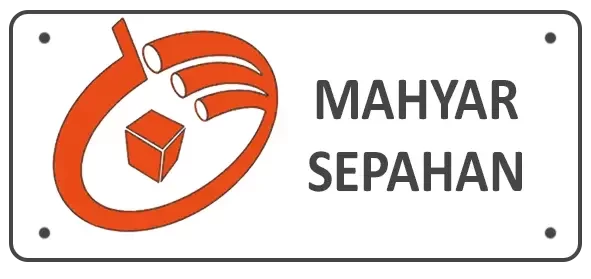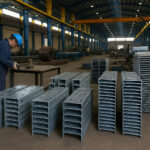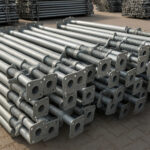Modular Formwork is a type of metal or composite formwork system used for concrete casting in construction and civil engineering projects. These formworks are manufactured in standard dimensions with interconnectable components, allowing for fast and highly accurate assembly and dismantling.

Key Features of Modular Formwork
Content list
Modularity (Interconnectable Design): Ability to connect multiple panels of different dimensions to create various form shapes.
Robust Metal Structure: Typically made of 3 mm steel sheets with reinforced ribs.
Durable Surface Coating: Hot-dip galvanizing or powder coating to prevent corrosion.
Multiple Reuse Capability: Can be reused for over 50 casting cycles without loss of quality.
Fast Assembly: Locking connections, pins, and wedges—often without the need for bolts and nuts.
Main Components of Modular Formwork
| Component | Application |
|---|---|
| Modular Panel | Main section for holding fresh concrete |
| Soldier | Vertical reinforcement member to withstand concrete pressure |
| Horizontal Brace | Provides lateral stiffness to the formwork |
| Wedge & Pin | Quick and secure connection of formwork parts |
| Concrete Pouring Platform Bracket | Ensures safety and working position for operators |
| Wing Nut & Tie Rod | Tighten formwork from both sides to apply even pressure |
Applications in the Concrete Industry
Casting concrete walls (shear, retaining, architectural)
Forming circular and square columns
Foundation and deep footing formwork
Slabs, bridges, and massive concrete structures
High-rise and mass housing projects
Advantages Over Traditional Formwork
Faster Execution: Pre-fabricated design and simple connections ensure much quicker assembly and dismantling.
Higher Dimensional Accuracy: Precise steel panel edges prevent distortions in finished concrete.
Cost Efficiency for Medium & Large Projects: Over 50–100 reuses per panel vs. 3–5 for wooden formwork.
Environmental Sustainability: Reduces wood and plastic use, supporting green construction practices.
Improved Safety: Compatible with heavy-duty bracing, scaffolding, and safe working platforms.

Comparison of Modular Formwork with Other Formwork Systems
| Feature | Modular Metal Formwork | Wooden Formwork | Plastic Formwork |
|---|---|---|---|
| Service Life | 50–100 uses | 3–5 uses | 10–15 uses |
| Installation Speed | High | Medium | High |
| Initial Cost | Relatively high | Low | Medium |
| Project Lifetime Cost | Very cost-effective | High (frequent replacements) | Medium |
| Moisture Resistance | Very high | Weak | High |
| Dimensional Accuracy | Highly precise | Limited | Limited |
| Suitable for Large Projects | ✔ Yes | ✘ No | ✔ Yes (to some extent) |
Market Status of Modular Formwork in Iran
Growing demand in infrastructure projects:
National civil works such as railways, dams, bridges, and metro systems
Mass housing projects (National Housing Movement)
Oil & gas projects requiring large-scale and precise formwork
Industrial projects including silos, power plants, and refineries
Export opportunities:
Iran, due to its competitive steel prices and skilled workforce, can supply modular formwork to neighboring countries such as Iraq, Afghanistan, Syria, Armenia, and Turkmenistan.
Installation and Implementation Steps in Construction Projects
Site preparation – Ensure the ground or foundation is leveled and ready for formwork placement.
Panel assembly with modular connections – Panels are joined using locking pins and wedges or spring pins; soldiers and horizontal braces are installed for stability.
Level and safety inspection – Check alignment using laser levels or water levels; install pouring platforms and safety rails.
Concrete pouring and vibration – Fresh concrete is placed and compacted using vibrators.
Dismantling after curing – Panels are removed carefully after 24–48 hours without damaging the concrete surface.
International Standards for Modular Formwork
ASTM A36 / DIN 17100 – Standards for structural steel raw materials
ISO 9001:2015 – Quality management system for manufacturing processes
EN 1065 – Standards for vertical support components (props)
ACI 347 – Guidelines for concrete formwork design and construction
Mahyar Sepahan strictly complies with these standards to provide safe and reliable products for both domestic and export projects.
Common Applications of Modular Formwork in Civil Projects
High-rise buildings – Columns, shear walls, elevator shafts, stair cores
Road & bridge projects – Retaining walls, abutments, concrete piers
Industrial & petrochemical facilities – Tanks, utility channels, equipment platforms
Dam construction & hydraulic structures – Piles, curved/radial formwork, arched sections
Power plants & refineries – Heavy foundation pours and large high-pressure slabs
Main Components of Modular Formwork
Flat and corner panels – Made from standard-thickness steel with anti-corrosion coating
Horizontal & vertical soldiers – Transfer loads and increase resistance to concrete pressure
Tie rods and wing nuts – Adjust spacing and prevent deformation
Clamps, pins, and wedges – Ensure quick and secure assembly
Concrete spacers – Maintain correct concrete thickness between form faces
Release agents – Facilitate easy stripping and prevent concrete adhesion

Maintenance Strategies for Extending the Service Life of Modular Formwork
Regular cleaning after each use
Oiling the surface of the formwork to prevent corrosion
Periodic inspection of welds, clamps, and connections
Storage in a dry space, away from moisture and acidic materials
Safe handling using cranes or forklifts for transportation
Key Points for Choosing the Right Modular Formwork
When selecting modular formwork, considering the following factors will help optimize time, cost, and project quality:
Type of project and concreting dimensions
For high-rise projects with high concrete pressure, thicker steel sheets and reinforced connections are required.
In contrast, for lighter or low-rise projects, simpler and more economical formworks are sufficient.Need for special design or customization
If the project includes angles, curves, or unique shapes, the ability to manufacture customized modular formwork in special dimensions becomes crucial.Transportation and assembly constraints
In cases where the project site has limited access, lighter and segmented formworks are recommended for easier transportation and handling.Compatibility with existing scaffolding and support systems
The selected formworks should be compatible with the project’s existing support structures.
Why Modular Formwork Is a Smart Investment
Minimizes human error compared to traditional formwork
Significantly reduces project execution time
Ensures high-quality concrete surfaces without the need for additional plastering
Can be rented or resold after project completion
Saves on manpower through fast and modular installation
Comparison Between Modular and Wooden Formwork
| Feature | Modular Formwork | Wooden Formwork |
|---|---|---|
| Resistance to pressure | High | Low |
| Service life | Over 80 uses | Around 5–8 uses |
| Dimensional accuracy | Precise, industrial | Dependent on worker skill |
| Installation speed | Fast | Time-consuming |
| Reusability | Very high | Limited |
Why Mahyar Sepahan Modular Formwork?
Precision manufacturing with CNC machines
Corrosion-resistant coating (galvanized or epoxy)
Custom design based on project drawings
Technical consultation and on-site supervision during formwork installation
High-capacity mass production for large-scale projects
Product warranty and after-sales service
Packaging, Transportation, and Storage of Modular Formwork
After completing concrete casting, the way formworks are handled greatly affects their lifespan and future performance. Companies like Mahyar Sepahan, by following proper packaging and logistics principles, ensure the quality of formworks in every usage cycle.
Steps for Proper Maintenance:
Wash immediately after use with a water jet or industrial brush
Completely dry to prevent rust
Oil the metal surfaces to increase lifespan
Store in a dry, covered, and insulated place
Stack and label in batches for reuse
Advantages of Modular Formwork in Large Infrastructure Projects
Metro Projects
Use of modular formwork in concrete tunnel walls, stations, and metro track foundations reduces execution time and ensures high precision in curves and angles.
Dam Construction
In dam projects, specially designed curved modular formworks can be used in large sections and under high pressure without deformation.
Water and Sewer Structures
Thanks to high resistance to moisture and pressure, modular formwork is an excellent choice for water channels, tanks, and manholes.
Modular Formwork Market in Iran and Export Opportunities
With the growth of construction projects, especially in the private sector and mass housing, the demand for modular formwork increases every year. Additionally, neighboring countries such as Iraq, Afghanistan, Armenia, and Syria present attractive target markets for exporting Iranian modular formwork.
Mahyar Sepahan manufactures formwork in compliance with global standards and has high export capacity in this sector.
Final Summary: Why Modular Formwork is a Smart Choice
| Criteria | Mahyar Sepahan Modular Formwork |
|---|---|
| Execution Speed | Very High |
| Dimensional Accuracy | Precise and as per design |
| Reuse Cycles | Over 80–100 times |
| Safety | Reliable for high-rise projects |
| Economic Savings | Significant in large projects |
| Technical Support | Provided by a specialized team |
FAQ – Frequently Asked Questions
Is modular formwork suitable for vertical concreting?
Yes, it is suitable for vertical walls, columns, polygonal sections, and even special structures like bridges.
How many times can modular formwork be reused?
With proper maintenance and cleaning, each formwork can be used up to 100 times.
How should formworks be stored after use?
By washing and oiling the surface, then stacking them in steel or wooden pallets.
Final Note – Why Mahyar Sepahan?
If you are looking for quality, durability, support, and real savings in your construction projects, Mahyar Sepahan modular formwork is the smart choice. Our expert team is ready to provide free consultation, custom formwork design, and after-sales service throughout Iran.
📞 Contact us for free consultation and purchase:
Mahyar Sepahan Co.
+98 912 118 0029
mahyarsepahan.com





